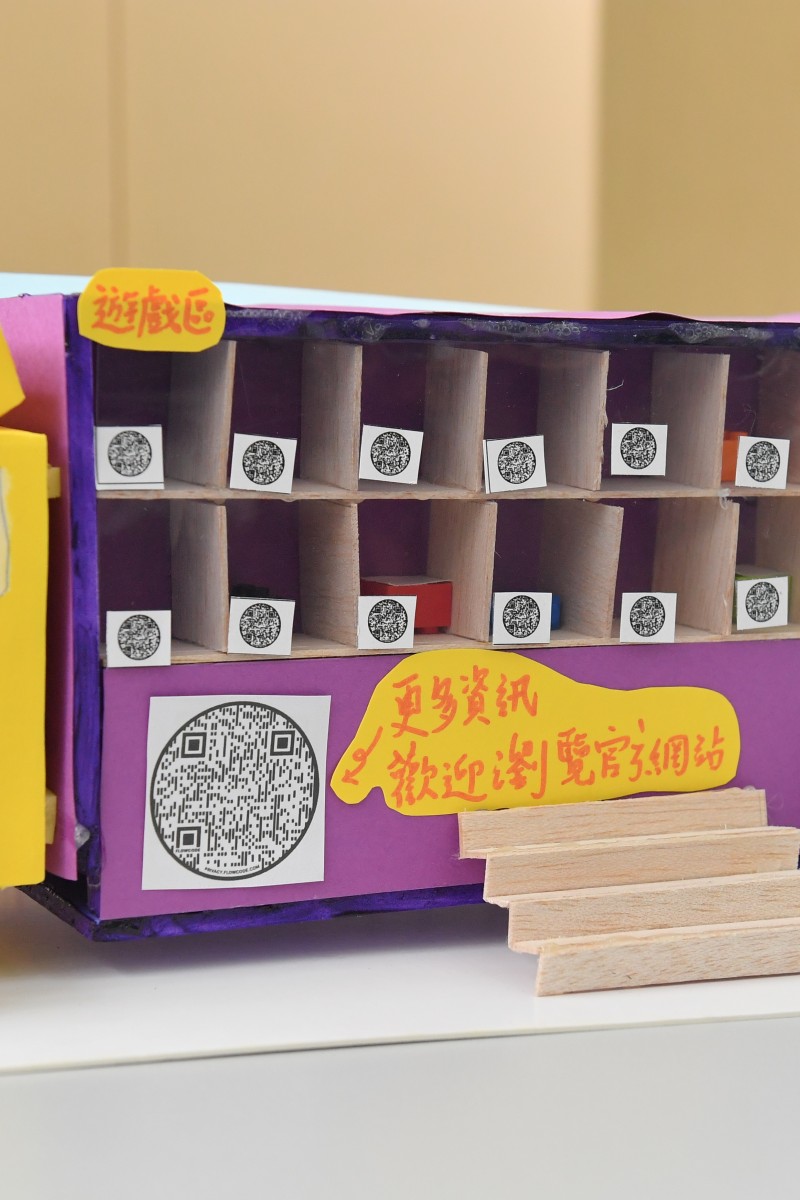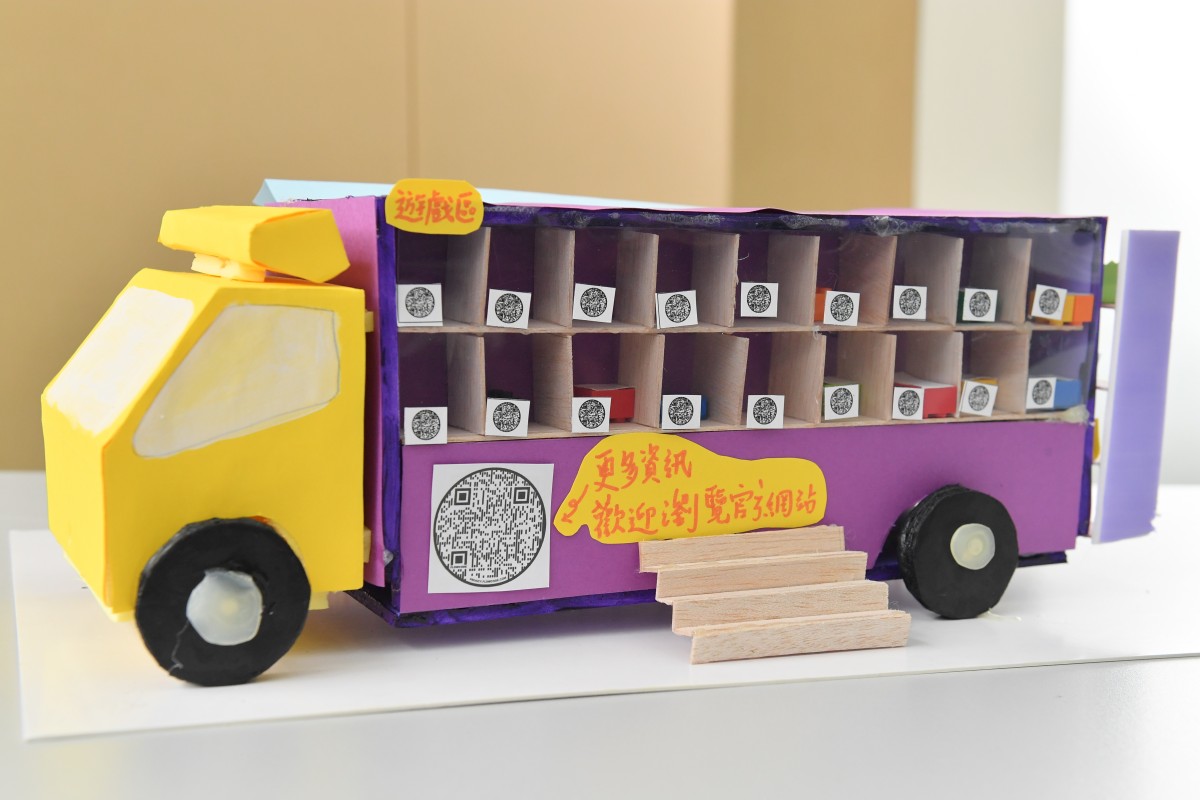
- The mental wellbeing of the elderly in remote areas and the social integration of cross-border students were among the issues discussed at the “Social Innovation⋅Community 4.0” competition
- Organised by the Hong Kong Council of Social Service and supported by the Citi Foundation, the competition incentivises teens to develop innovations that help specific segments of the community
 The winning design in this year's Social Innovation⋅Community 4.0 Competition was a mobile e-games truck aimed at improving the mental wellbeing of elderly people in remote areas. Photo: HKCSS
The winning design in this year's Social Innovation⋅Community 4.0 Competition was a mobile e-games truck aimed at improving the mental wellbeing of elderly people in remote areas. Photo: HKCSSThe mental wellbeing of the elderly living in remote areas of the North District, undesirable living environments, and the social integration of cross-border students were among the issues for which contestants at the “Social Innovation⋅Community 4.0” competition strived to develop creative solutions.
Organised by the Hong Kong Council of Social Service (HKCSS) and supported by the Citi Foundation, the community-based competition incentivises teens to develop innovations that help specific segments of the community address their needs and tackle challenges.
In an immersive process spanning eight months, HKCSS arranged multiple training sessions for the contestants, in collaboration with the Hong Kong Science and Technology Parks Corporation, the Hong Kong University of Science and Technology and the School of Design at Hong Kong Polytechnic University, to guide them and give them the skills they need to adopt design thinking and use their STEM skills to develop prototypes for their ideas.
Take a look at the process of creating these inventions
As part of their research to understand the challenges faced by the residents in the North District - this year’s area of focus - students conducted field studies and interviewed the locals. They said the meetings were vital for them to identify the specific issues that their solutions were designed to address.
The competition also featured public online voting and community trial sessions that helped teens modify their prototypes and further enhance their feasibility.
Students from 28 secondary schools in 18 districts formed 45 teams to enter the competition, which just completed its third year. The final 15 teams were selected to produce prototypes based on their ideas and present them to final round judges.
The first runners-up developed a prototype for an earthworm-inspired wastewater bio-filtering and treatment system that produces clean water for irrigation and biofertiliser for sale. Photo: Photo: HKCSS
To celebrate the achievements and commitment of the contestants, as well as recognise the efforts of the Community Partners, a prize presentation ceremony was held on July 16, 2021. At the event, the Commissioner of the Efficiency Innovation and Technology Bureau of HKSAR, Ivan Lee Kwok-bun, JP, congratulated students for successfully using design thinking and STEM skills to innovate technological solutions and tackle social issues.
Echoing Lee’s sentiment was Wayne Fong, Head of Corporate Affairs at Citi, who said he was impressed with the improvement contestants made every year.
“Citi will continue to support the competition. We hope students will become more aware of the unique issues confronting each district and formulate sustainable solutions for the stakeholders.”
Is this fashion's eco-friendly future?
The Chief Executive of HKCSS, Chua Hoi-wai, appreciated the students’ perseverance and commitment in participating in the competition, despite the pandemic-related measures.
“We are glad to help teens transform their creative ideas into practical solutions for social issues,” he said.
The champion team was from True Light Girls’ College. Their prototype “EGames Truck” is a mobile centre equipped with games to provide entertainment for the elderly living in isolated areas, with the objective of improving their mental and social wellbeing. Team member Esther Wong said the games featured IT elements, including QR codes and custom-built apps, that acted as a step-by-step guide to enhance the elderly’s digital literacy.
Bridging together education and design
Another team member, Stephanie Ong, said her group was inspired to create the truck after interviewing locals in the North District who said it was too difficult to join courses at community centres.
“To address this issue, we designed a mobile centre that motivates them to come and play. We applied design thinking and empathy when we developed our games so that they would provide a satisfying experience for the elderly,” she said.
At the ceremony, a social welfare organisation approached the team to explore the possibility of transforming the project into a real mobile centre.
The mobile games unit was made for elderly people who had difficulty getting to community centres to socialise with other people. Photo: HKCSS
The first runners-up, from Shek Lei Catholic Secondary School, developed a prototype for an earthworm-inspired wastewater bio-filtering and treatment system that produces clean water for irrigation and biofertiliser for sale.
The project aimed to help improve people’s living environments and help them earn some extra income.
Team leader Au Ka-man appreciated the opportunity to fully immerse themselves in the process.
“Because of the lack of online documents, our team visited the North District as part of the fact-finding,” Au noted. “Since the development and production of our prototype required constant communication, our team used WhatsApp a lot for discussion. We have been able to enhance our communication skills as a result.”
The journey to make robots more human
The second runner-up, from Raimondi College, created a prototype for a role-playing game that made it fun for cross-border students to familiarise themselves with the slang and lifestyle unique to Hong Kong, with the aim of speeding up their social integration.
Team member Yan Yan said one of the most memorable moments of the competition was a training session at Science Park. “We did not know much about STEM prior to the contest. The session really exposed us to these specialised skills. I was also impressed with the excellent presentation skills of the instructor.”
A role-playing game helps cross-border students learn more about the culture of Hong Kong. Photo: HKCSS
The champion team will join a fully-sponsored Overseas Social Innovation Tour, and the finalists’ prototypes were on display at North District Town Hall in Sheung Shui for a period in July.
The 4th “Social Innovation⋅Community 4.0 Competition” will focus on Sham Shui Po. Applications will be open in mid-October.